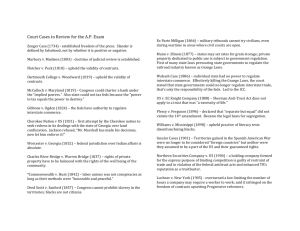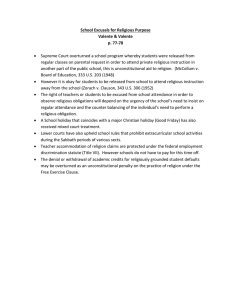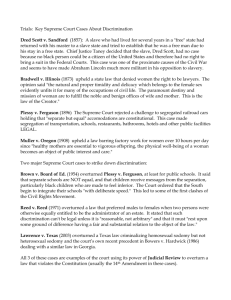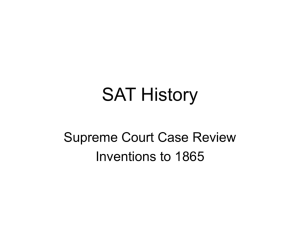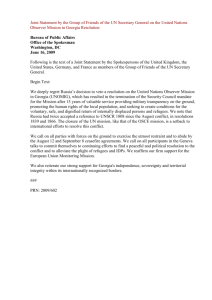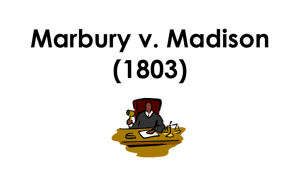Court Cases to Review for the
advertisement
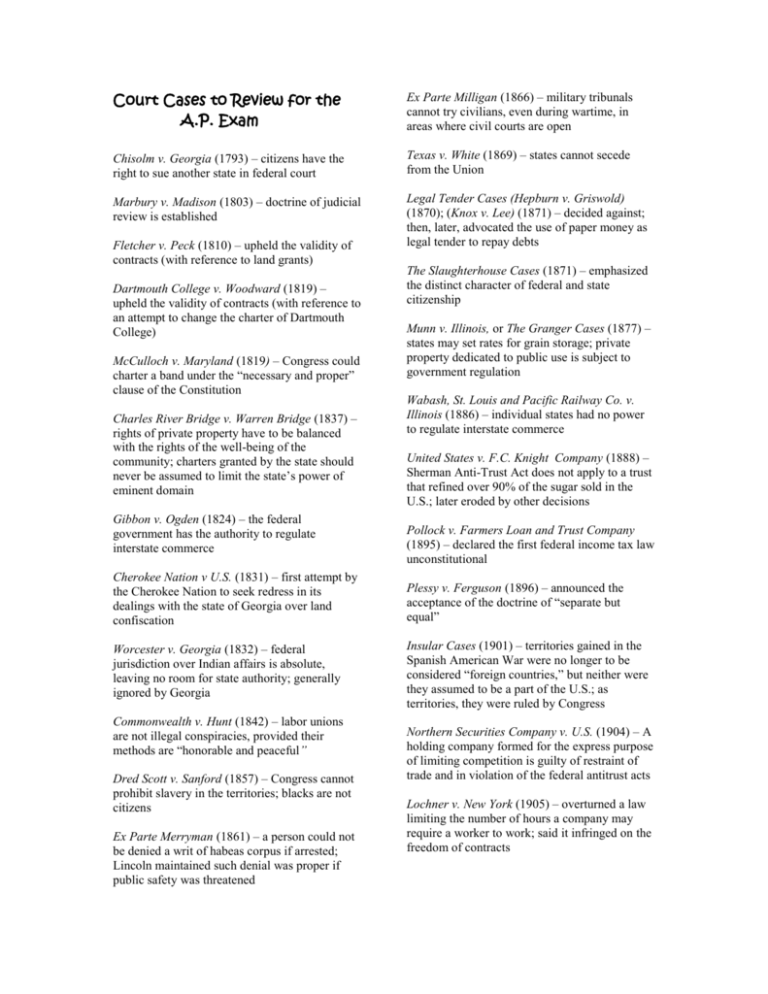
Court Cases to Review for the A.P. Exam Ex Parte Milligan (1866) – military tribunals cannot try civilians, even during wartime, in areas where civil courts are open Chisolm v. Georgia (1793) – citizens have the right to sue another state in federal court Texas v. White (1869) – states cannot secede from the Union Marbury v. Madison (1803) – doctrine of judicial review is established Legal Tender Cases (Hepburn v. Griswold) (1870); (Knox v. Lee) (1871) – decided against; then, later, advocated the use of paper money as legal tender to repay debts Fletcher v. Peck (1810) – upheld the validity of contracts (with reference to land grants) Dartmouth College v. Woodward (1819) – upheld the validity of contracts (with reference to an attempt to change the charter of Dartmouth College) McCulloch v. Maryland (1819) – Congress could charter a band under the “necessary and proper” clause of the Constitution Charles River Bridge v. Warren Bridge (1837) – rights of private property have to be balanced with the rights of the well-being of the community; charters granted by the state should never be assumed to limit the state’s power of eminent domain Gibbon v. Ogden (1824) – the federal government has the authority to regulate interstate commerce The Slaughterhouse Cases (1871) – emphasized the distinct character of federal and state citizenship Munn v. Illinois, or The Granger Cases (1877) – states may set rates for grain storage; private property dedicated to public use is subject to government regulation Wabash, St. Louis and Pacific Railway Co. v. Illinois (1886) – individual states had no power to regulate interstate commerce United States v. F.C. Knight Company (1888) – Sherman Anti-Trust Act does not apply to a trust that refined over 90% of the sugar sold in the U.S.; later eroded by other decisions Pollock v. Farmers Loan and Trust Company (1895) – declared the first federal income tax law unconstitutional Cherokee Nation v U.S. (1831) – first attempt by the Cherokee Nation to seek redress in its dealings with the state of Georgia over land confiscation Plessy v. Ferguson (1896) – announced the acceptance of the doctrine of “separate but equal” Worcester v. Georgia (1832) – federal jurisdiction over Indian affairs is absolute, leaving no room for state authority; generally ignored by Georgia Insular Cases (1901) – territories gained in the Spanish American War were no longer to be considered “foreign countries,” but neither were they assumed to be a part of the U.S.; as territories, they were ruled by Congress Commonwealth v. Hunt (1842) – labor unions are not illegal conspiracies, provided their methods are “honorable and peaceful” Dred Scott v. Sanford (1857) – Congress cannot prohibit slavery in the territories; blacks are not citizens Ex Parte Merryman (1861) – a person could not be denied a writ of habeas corpus if arrested; Lincoln maintained such denial was proper if public safety was threatened Northern Securities Company v. U.S. (1904) – A holding company formed for the express purpose of limiting competition is guilty of restraint of trade and in violation of the federal antitrust acts Lochner v. New York (1905) – overturned a law limiting the number of hours a company may require a worker to work; said it infringed on the freedom of contracts Muller v. Oregon (1917) – upheld an Oregon law limiting the number of hours women could be employed in industry; to safeguard their childbearing ability Bunting v. Oregon (1917) – extended the above ruling to include all industrial workers (10 hours day); overturned Lochner v. New York Hammer v. Dugenhart (1918) – overturned a law banning products made by child labor from being sold in interstate commerce; reversed in 1941 in U.S. v. Darby Lumber Company Schenck v. U.S. (1919) – freedom of speech may be curtailed if exercising that right posed a “clear and present danger” to others or to the state Schecter Poultry Corporation v. U.S. (1935) – declared the NIRA unconstitutional U.S. v. Butler (1936) – declared the Agricultural Adjustment Act unconstitutional Smith v. Allwright (1944) – overruled practices like the “all-white” primary in choosing state and national officials Korematsu v. U.S. (1944) – upheld the 1942 removal of Japanese-Americans to relocation centers in inland camps; declared within the combined war powers of Congress Sweatt v. Painter (1950) – held that intangible factors may be considered in determining whether professional education programs are comparable under the separate but equal doctrine Brown v. Board of Education of Topeka, Kansas (1954, 1955) – overturned the “separate but equal” ruling in Plessy; mandated that segregated facilities be eliminated “with all deliberate speed” Mapp v. Ohio (1961) – illegally obtained evidence may not be used as evidence in state criminal proceedings Engel v. Vitale (1962) – ended prayer in public schools Baker v. Carr (1962) – allowed the question of reapportionment to be brought up in federal courts Gideon v. Wainwright (1963) – guaranteed defendants a court-appointed attorney if they were unable to pay for their own Reynolds v. Sims (1964) – one person-one vote to be used in apportioning state legislatures Griswold v. Connecticut (1965) – struck down birth control regulation as an impermissible invasion of privacy Escobedo v. Illinois (1964) – police may not use information for prosecution that was obtained from a suspect who was not first advised of his right to counsel Westberry v. Sanders (1964) – the Court applied the one-man-one vote standard to the apportionment of congressional districts Miranda v. Arizona (1966) – expanded the above ruling by adding that a suspect must also be informed of his right to remain silent In re Gault (1967) – Court extended some due process privileges to juvenile court proceedings New York Times v. U.S. (1971) – dissolved an injunction against the New York Times that had restrained publication of the Pentagon Papers Furman v. Georgia (1972) – nullified the death penalty in the U.S. for being to capriciously applied Roe v. Wade (1973) – legalized abortion through the second trimester of pregnancy U.S. v. Richard Nixon (1974) – declared the right of executive privilege could not be invoked in cases involving criminal activity Regents of the University of California v. Bakke (1978) – overturned racial quotas for some admissions programs; “reverse discrimination” case New Jersey v. T.L.O. (1985) – searching a student’s handbag is justified if there is reasonable grounds for suspecting the search will yield evidence that laws or school rules are being broken
